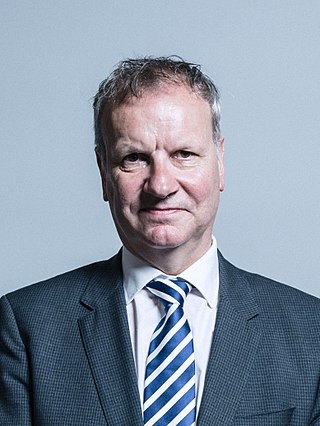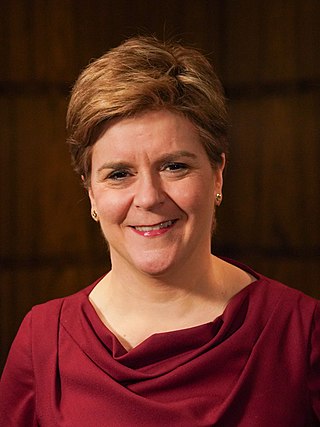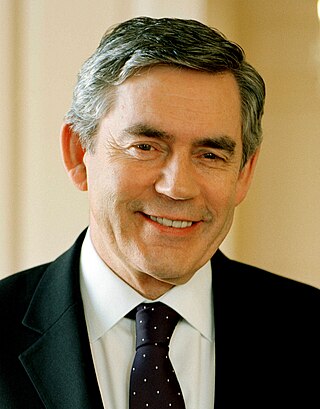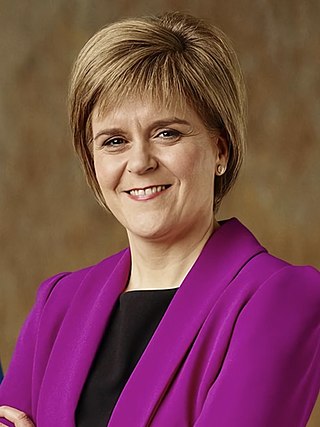Related Research Articles

Scottish independence is the idea of Scotland regaining its independence and once again becoming a sovereign state, independent from the United Kingdom. The term Scottish independence refers to the political movement that is campaigning to bring it about.

Peter Wishart is a Scottish National Party (SNP) politician and musician who has served as the Member of Parliament (MP) for Perth and Kinross-shire since 2024. He previously served as the MP for Perth and North Perthshire from 2005 to 2024 and North Tayside from 2001 to 2005.

Nicola Ferguson Sturgeon is a Scottish politician who served as First Minister of Scotland and Leader of the Scottish National Party (SNP) from 2014 to 2023. She has served as a member of the Scottish Parliament (MSP) since 1999, first as an additional member for the Glasgow electoral region, and as the member for Glasgow Southside from 2007.

Johann MacDougall Lamont is a Scottish Labour Co-operative politician who served as Leader of the Scottish Labour Party from 2011 to 2014. She was previously a junior Scottish Executive minister from 2004 to 2007 and Deputy Leader of the Scottish Labour Party from 2008 until her election to the leadership in 2011. In addition to her ministerial and leadership roles, she has been a campaigner on equality issues and violence against women throughout her political career.
Glenn Campbell is a Scottish journalist and broadcaster for BBC Scotland news and current affairs, currently political editor for BBC Scotland. He grew up on Islay and studied at the University of Glasgow.

Alexander Elliot Anderson Salmond was a Scottish politician who served as First Minister of Scotland from 2007 to 2014. A prominent figure in the Scottish nationalist movement, he was Leader of the Scottish National Party (SNP) on two occasions, from 1990 to 2000 and from 2004 to 2014. He then served as leader of the Alba Party from 2021 until his death in 2024.

A referendum on Scottish independence from the United Kingdom was held in Scotland on 18 September 2014. The referendum question was "Should Scotland be an independent country?", which voters answered with "Yes" or "No". The "No" side won with 2,001,926 (55.3%) voting against independence and 1,617,989 (44.7%) voting in favour. The turnout of 84.6% was the highest recorded for an election or referendum in the United Kingdom since the January 1910 general election, which was held before the introduction of universal suffrage.

The United Kingdom general election debates of 2010 consisted of a series of three leaders' debates between the leaders of the three main parties contesting the 2010 general election: Gordon Brown, Prime Minister and leader of the Labour Party; David Cameron, Leader of the Opposition and Conservative Party; and Nick Clegg, leader of the third largest political party in the UK, the Liberal Democrats. They were the first such debates to be broadcast live in the run-up to a UK election.
Better Together was the successful campaign for a No vote in the 2014 Scottish independence referendum, advocating Scotland to remain a country of the United Kingdom. The organisation was formed in June 2012, operating until winning the vote on the referendum's polling day on 18 September 2014 with 2,001,926 (55.3%) voting against independence and 1,617,989 (44.7%) voting in favour. In June 2014, the campaign adopted a No Thanks branding, in relation to the referendum question.
This is a list of events in Scottish television from 2014.
Events from the year 2014 in Scotland.
This page lists the public opinion polls that were conducted in relation to the 2014 Scottish independence referendum, that was held on 18 September 2014. Overall, polls showed that support for a "No" vote was dominant until the end of August 2014, when support for a "Yes" vote gained momentum and the gap closed significantly, with at least one poll placing the "Yes" vote ahead. In the final week of the campaign, polls showed the "No" vote to be consistently but somewhat narrowly ahead. There were no exit polls although a YouGov post-election poll was published shortly after the polls closed. For the history of the campaign itself see 2014 Scottish independence referendum, Yes Scotland, and Better Together (campaign).

Salmond & Darling: The Debate is a Scottish television debate that was first broadcast on STV on 5 August 2014. The two-hour broadcast marked the first face-to-face debate between First Minister Alex Salmond and Alistair Darling, chairman of the Better Together Campaign, ahead of the forthcoming Scottish independence referendum, in front of a studio audience of 350 people.
Scotland Decides: The Big, Big Debate was a one-off British television programme broadcast by the BBC on 11 September 2014, a week prior to the 2014 Scottish independence referendum. The 60-minute show was recorded at Glasgow's OVO Hydro during the afternoon prior to broadcast. It was presented by Scottish journalist James Cook before an audience of about 7,500 16- and 17-year-olds, first-time voters on the day of the referendum, some of whom were invited to quiz a panel of prominent politicians from both the "Yes" and "No" campaigns.
The 2015 United Kingdom general election debates were a series of four live television programmes featuring the leaders of seven main British parties that took place during the run-up to the general election. They each featured different formats and participants.

A general election was held in the United Kingdom on 7 May 2015 and all 59 seats in Scotland were contested under the first-past-the-post, single-member district electoral system. Unlike the 2010 general election, where no seats changed party, the Scottish National Party (SNP) won all but three seats in Scotland, gaining a total of 56 seats. The SNP received what remains the largest number of votes gained by a single political party in a United Kingdom general election in Scotland in British history, breaking the previous record set by the Labour Party in 1964 and taking the largest share of the Scottish vote in sixty years, at approximately 50 per cent.

A second referendum on Scotland becoming independent of the United Kingdom (UK) has been proposed by the Scottish Government. An independence referendum was first held on 18 September 2014, with 55% voting "No" to independence. The Scottish Government stated in its white paper for independence that voting Yes was a "once in a generation opportunity to follow a different path, and choose a new and better direction for our nation". Following the "No" vote, the cross party Smith Commission proposed areas that could be devolved to the Scottish Parliament; this led to the passing of the Scotland Act 2016, formalising new devolved policy areas in time for the 2016 Scottish Parliament election campaign.

A general election was held in the United Kingdom on Thursday 8 June 2017; all 59 seats in Scotland were contested under the first-past-the-post electoral system.

The 2019 United Kingdom general election was held on Thursday 12 December 2019, two and a half years after the previous general election in June 2017. The Scottish National Party (SNP) received the most votes and won 48 out of 59 seats—a gain of 13 over those won in 2017, and 81% of the Scottish seats in the House of Commons.

Alex Salmond's term as first minister of Scotland began on 17 May 2007 when he was formally sworn into office at the Court of Session. It followed his Scottish National Party's win at the 2007 Scottish Parliament election, where his party defeated the incumbent Labour Party by just one seat. Salmond's term ended on 18 November 2014, following his resignation in the aftermath of the Yes campaign's defeat in the 2014 Scottish independence referendum.
References
- 1 2 "Scottish independence: Council apology over TV debate tweet". BBC. 26 August 2014. Retrieved 26 August 2014.
- 1 2 "Salmond Wins Round Two". What Scotland Thinks. 26 August 2014. Retrieved 26 August 2014.
- 1 2 3 "Salmond v Darling - What the Scottish papers say". BBC News. BBC. 26 August 2014. Retrieved 26 August 2014.
- 1 2 3 4 5 6 7 8 "Scottish independence: Campaigners give their verdict on Salmond v Darling". BBC. 26 August 2014. Retrieved 26 August 2014.
- ↑ Plunkett, John (6 August 2014). "STV apologises over livestream crashes in Scottish independence debate". The Guardian. Retrieved 6 August 2014.